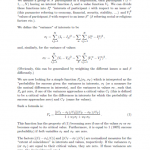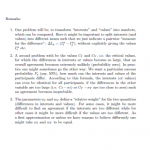You are currently viewing a placeholder content from Youtube. To access the actual content, click the button below. Please note that doing so will share data with third-party providers.
Although our present institutions often do not enable transnational collective action to protect the global commons and advance human welfare sustainably, we must achieve these ends. We propose an international conference, initiated by the G20, building on the Paris Agreement on Climate Change and the 2030 Agenda for Sustainable Development , to define a desirable world order for 2030, and to reach agreement on effective means to achieve this at appropriate scales.
Challenge
To address systemic global risks and protect the global commons in a world of 7.5 billion people, we must manage transnational challenges more effectively. The tension between the pressures on national leaders from their citizens, and the trade-offs needed to balance costs and benefits in inter-national and inter-temporal transactions, makes collective action difficult. Our failure to achieve that balance has undermined trust in governments and other social institutions. Recent events – from the global financial crisis and recession, through geopolitical clashes, forced migration, and domestic instability, to evidence of inflection points in transgressing planetary boundaries – show the weakness of our present instruments. In the face of an extraordinary technological transformation that will disrupt the worlds of education, work, social organisation and politics, we need new structures and systems in a global order that is fit for purpose in the second decade of the 21st century.
Proposal
Vision
Although it usually requires a major, destructive war before states seek to create a new political-economic order, this is not a prerequisite. We are intelligent beings, and can start the process of creating a new world order without waiting for a catastrophe to destroy what we have today.
Five elements of a Global Agenda can frame our effort: The first three are challenges that must be managed for our survival; the last two are key enablers for success.
Challenges
- Delivering environmentally and socially sustainable economic growth – for without this, we cannot achieve anything else
- Reducing poverty and improving equity – because exceptional prosperity for the few at the expense of the many is neither morally justifiable nor politically sustainable
- Addressing the sources of global and national vulnerability, and promoting security – for security underpins both community and progress
Enablers
- Sharing the norms and values that enable global coexistence, and respecting cultural differences – because respect for core values and universal norms allows us to live in harmony, while appreciation of cultural diversity enriches our understanding; and
- Improving the quality of global governance and global institutions – for the important challenges of a highly-connected world cannot otherwise be resolved.
Hedley Bull[i] counselled that a global society must comprise: ’ . . . a group of states, conscious of . . . common interests and common values . . . conceiv[ing] themselves to be bound by a common set of rules in their relations to one another.”
Today, our global society is characterized by profound, multivariate asymmetry between the scale of a highly integrated global economy, the absence of a commensurate sense of global community, and the defective state of the global polity. This causes weak economic governance; economic and social volatility; normative clashes, and social and geopolitical turbulence.
This suggests that:
No overarching concept of the desirable principles of a future global order will soon emerge from formal exchanges between the world’s leading powers. While a common vision is needed, the cultural and political preferences of political elites – and the populist forces emerging from economic and social pressures and perceived threats to identity – will frustrate its emergence.[ii]
The interplay between long-range geo-economic trends, geopolitical tensions, and domestic social inequality and anger, exacerbated by the accelerating technological transformation of work and education, is fracturing national societies and weakening representative democracy.[iii]
Our failure to deal adequately with this is exceptionally dangerous. We need to address the sources of acute inequality within too many societies; restore possibilities for upward mobility; provide social safety nets for those who cannot be reskilled and accommodated in labour markets; invest in the transformation of education and skills training to enable horizontal mobility and lifelong learning; and build social capital and cohesion to enable burden-sharing as we transition.
But, preoccupation with the need to respond to domestic imperatives makes collaboration on “common goods” and coordinated responses to terrorism, violent extremism and organised crime more difficult. The contraction of international trade regimes, if unchecked, will dislocate global value chains, slow growth, and increase geopolitical stress. This challenge is global, and the G20 must address it urgently.
Established structures and systems need radical reform, including institutions of global, regional and national governance and regional security; “free markets” as we have defined them in the past 25 years; the relationship between education, training and employment in a new technological age; and systems of social coexistence shaped by rapid urbanization and globalization, that are now under stress in many advanced economies.
We shall not be able to reach agreement on all issues at a global scale, so we must determine at what scales collective agreement on particular outcomes is necessary and feasible.
On the global scale, disagreements between permanent members of the UN Security Council have led to vetoes.[iv] The requirement of consensus in the World Trade Organization has frustrated the conclusion of the Doha Round.[v] The recommendations on reform by the United Nations High-level Panel on Threats, Challenges and Change in 2004, have led to no substantive results.[vi] Delays in ratifying changes to the voting rights and quotas of members of the International Monetary Fund and the World Bank Group, led China to launch alternative, ‘complementary’ organizations.[vii]
But the negotiations in the COP 21 round of the United Nations Framework Convention on Climate Change, led to the Paris Agreement, facilitated by a shift from common but differentiated responsibilities, to credible, nationally determined contributions which states committed to execute, and to strengthen in future.[viii] The tactical recalibration from obligations to contributions allowed states to transcend earlier arguments between emerging and advanced economies, to focus on what all could do to avert the disastrous effects of excessive atmospheric warming, while still enabling economic development.
Likewise, the adoption of seventeen Sustainable Development Goals (SDGs) to end poverty, fight inequality and tackle climate change, in the 2030 Agenda in September 2015, was a substantial achievement. Like the commitments in the Paris Agreement, the SDGs are not legally binding, though States are responsible for implementing them, and for collecting national data, to feed into regional reviews for global consolidation.[ix]
The success of these bottom-up approaches enables us to envision a means to achieve a sense of “common interests and common values”, and move towards acceptance of “a common set of rules in [states’] relations to one another.”[x]
The G20 Summit should thus acknowledge the urgency of the challenge, and call for an international conference of state parties, under the auspices of the United Nations, to address the need for a new global order that maintains the best of the past, while addressing the needs of the present and the future.
In this Conference –
- Each state should transparently define a desirable end state for the global order in 2030, building on Agenda 2030 and the Paris Agreement on Climate Change.
- The topics of the Global Agenda – balancing environmental sustainability with equitable socio-economic advancement and human, national and global security – should frame the discussions.
- National and regional consultations, like those that led to the SDGs, would spark national debates among policymakers and persons from business and civil society, allow for reciprocal learning within and between nations, help dispose of prejudice, and undercut dangerous fact-free populism.
- The discussions should clarify the values that motivate each state’s objectives, and shed light on the norms and legal instruments that can advance them.
The Conference would seek to clarify:
- The shared interests and common values of all humanity, as well as the diversity of individual, community and national interests, and the varied ways in which human societies assemble hierarchies of universal values;
- the principles – based the dignity of the human person and the need to balance environmental sustainability with human, national and global security, and equitable socio-economic advancement – that should guide the workings of systems of governance at national, regional and global scales;
- the rules of international law by which state parties agree to be bound, and the normative conventions they will undertake to respect, in their relations with one another;
- the purposes and characteristics of an international order fit for purpose in the 21st century;
- the institutions needed to keep the peace, enable responsible growth and development, and promote human dignity and ecological responsibility;
- the ways in which states, communities, interest groups and individuals ought to be represented in, and able to influence the deliberations, decisions and actions of, these institutions;
- the nature and workings of an appropriate world system that will enable dynamic stability through the expression, aggregation and reconciliation of divergent interests; prudent legislation and efficient administration of matters affecting the global commons; and effective, legitimate adjudication of disputes by applying recognised statutory, and peremptory principles of customary, international law.
If we can reach agreement on the defining elements of an end state in 2030, subsequent discussions on how to achieve it will be more constructive, and more likely to succeed. Experience in conflict resolution teaches that even conflicted actors can discuss strategy effectively after they have reached agreement on goals.[xi]
The challenge is large, but no larger than similar endeavours undertaken in the past after great conflicts. The question is whether we can summon the will to create a fitting world order before we confront a larger catastrophe. Time is of the essence, and the G20 must seize the moment.
Sean Cleary, FutureWorld Foundation, has written this contribution with inputs from:
Erik Voeten (Georgetown University, USA)
Sergey Kulik, Igor Yurgens (Institute for Contemporary Development, Russia)
Wang Wen (Renmin University of China, People’s Republic of China)
Pratap Bhanu Mehta, Srinath Raghavan (Centre for Policy Research, India)
Fernando Blumenschein and Diego Navarro (Fundação Getúlio Vargas, Brazil)
Endnotes
[i] Hedley Bull, The Anarchical Society: A Study of Order in World Politics, 1997
[ii] http://www.economist.com/news/leaders/21710249-his-call-put-america-first-donald-trump-latest-recruit-dangerous Accessed 20161119
[iii] https://www.researchgate.net/publication/272427075_
Challenges_of_Global_Complexity_-_httpswwwfutureworldfoundationorg
ContentArticleaspxArticleID9868 Accessed 20161120
[iv] See http://research.un.org/en/docs/sc/quick
[v] https://www.wto.org/english/tratop_e/dda_e/dda_e.htm
[vi] http://www.un.org/en/peacebuilding/pdf/historical/hlp_more_secure_world.pdf
[vii] Including the Asian Infrastructure Investment Bank, the [BRICS] New Development Bank, the Silk Road Fund, and the One Belt, one Road initiative. http://www.bloomberg.com/news/articles/2015-12-18/congress-approves-imf-changes-giving-emerging-markets-more-sway
[viii] In 2015, 196 parties to the convention attended the UN Climate Change Conference in Paris from 30 November – 12 December, and adopted the Paris Agreement by consensus, aimed at limiting global warming to less than two degrees Celsius, and pursue efforts to limit the rise to 1.5 degrees Celsius. The threshold for entry into force of the Paris Agreement was achieved on 5th October 2016, with the Agreement entering into force on 4th November 2016. http://unfccc.int/paris_agreement/items/9485.php
[ix] http://www.un.org/sustainabledevelopment/development-agenda/
[x] Hedley Bull, op. cit.
[xi] Cleary, Identity Politics (2016), https://www.researchgate.net/publication/306439116_
Identity_Politics_Sectarian_Conflict_and_Regional_Political_Rivalry_in_the_Middle_East?ev=prf_high
APPENDIX









